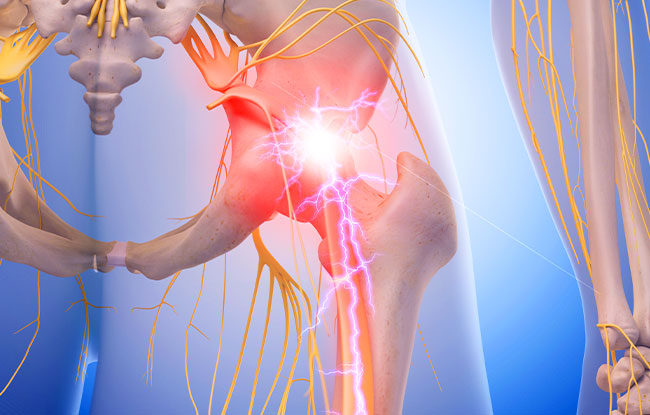Sciatica Capitola
Sciatica
Sciatica, or Lumbar radiculopathy, is a common problem caused when nerve roots in the lumbar spine are irritated or compressed. These nerves travel from your lower back through your hips, buttocks, legs, and feet, so an injury in the lumbar spine can cause symptoms in these areas. Nerve root injury may occur at any five vertebrae in the lumbar spine (called the L1 through L5) or at the sacrum level (the upper portion of which is called the S1).
Sciatica symptoms include pain, weakness, numbness, and tingling, depending on the level of injury. It can start in the lower back and extend down your leg, to your calf, foot, or even your toes. In some cases, nerves affecting the bowel and bladder can become compressed, leading to bowel or bladder incontinence or loss of control. You can feel the pain below the knee. It may also worsen when you sit, stand, sneeze or cough.

What Can Cause Sciatica?
Aging, injury, poor posture, extra body weight, and other issues can lead to problems in the lower back. These problems can irritate the nerve roots. Several different medical conditions can cause sciatica, such as:
- Herniated or slipped disc
- Degeneration disc disease
- Spinal stenosis
- Spondylolisthesis
- Osteoarthritis
These conditions may develop over time or spontaneously due to trauma or physical stress injury. Sometimes one can find no cause. Health conditions such as diabetes or Lyme disease can cause symptoms of sciatica.
We Help Sciatica
Sciatica affects about 40% of the population around the age of 40 years. Certain occupations that place a lot of strain on your back, such as machine operators or truck drivers, often develop sciatica.
If you are among the population who have developed sciatica or may have symptoms, contact Harbor Health Center at (831) 200-0880 to schedule an evaluation! To diagnose sciatica, our doctor will take a medical history and conduct a physical examination to identify the patient’s leg’s pain pattern. During the physical examination, you will be asked to perform basic exercises that stretch the sciatica nerve. If any shooting pain down the leg develops while executing these exercises, it can indicate sciatica is the cause of your pain. X-rays and other specialized imaging tools may be required to confirm which nerve roots are affected.
Many cases of lumbar radiculopathy can be treated successfully with nonsurgical treatments. Our doctor can develop a treatment plan depending on the severity of your symptoms and the underlying medical condition. You may contact us to discuss the treatment options we offer to help cope with sciatica pain and avoid the progression of symptoms!
